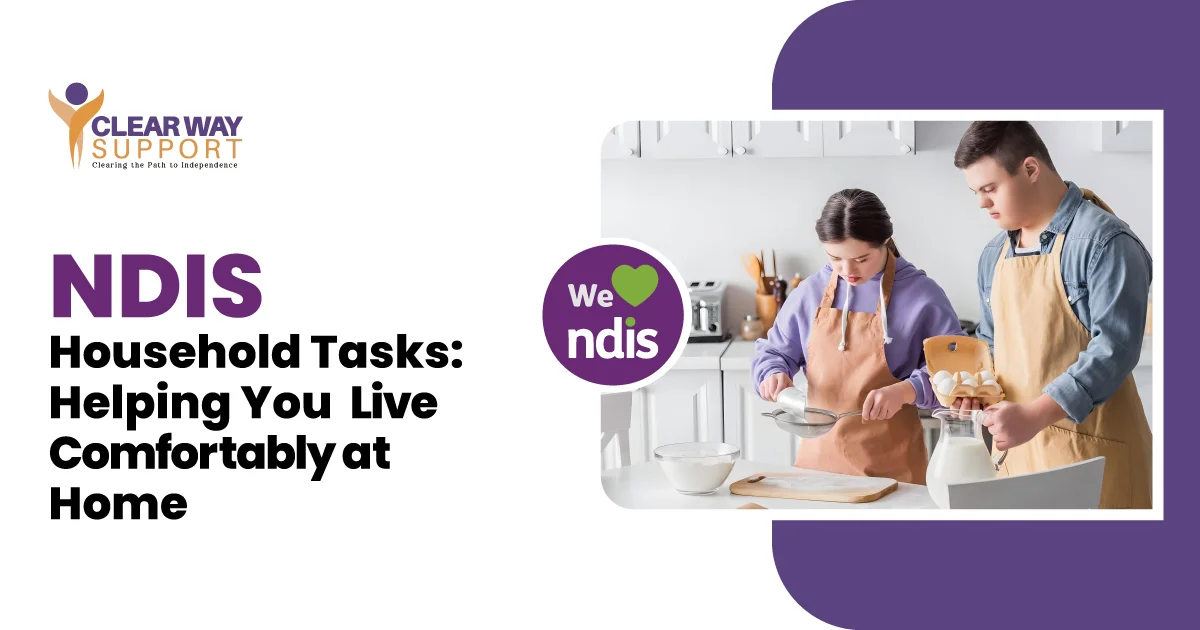Every person deserves to feel comfortable and safe in their own home. For people with disabilities, managing everyday household tasks can sometimes be difficult. That’s where NDIS Household Tasks support comes in. Funded by the National Disability Insurance Scheme (NDIS), this service is designed to help people with disabilities live more independently by supporting them with tasks around the house.
This blog will explain everything about NDIS Household Tasks in simple, easy-to-understand language. We’ll look at what these tasks are, who can benefit, how the support works, and what the benefits are. Whether you’re an NDIS participant or simply curious, you’ll find everything you need to know here.
What Are NDIS Household Tasks?
NDIS Household Tasks are services provided through the NDIS to help people with disabilities take care of their homes. The program is designed to make sure participants can live in a clean, safe, and comfortable space.
These tasks might include cleaning, laundry, cooking, or even yard work. The goal is to support people who may find it hard to do these tasks themselves due to their disability.
For example:
- Someone who has difficulty bending or lifting might get help with vacuuming or mopping floors.
- A person in a wheelchair might need assistance with cooking meals or washing dishes.
- Someone with limited mobility could receive help with changing bedsheets or doing grocery shopping.
NDIS Household Tasks are about more than just keeping things tidy. They allow people to live independently and enjoy their homes without feeling stressed or overwhelmed by daily chores.
Who Can Benefit from NDIS Household Tasks?
NDIS Household Tasks are for anyone in the NDIS program who needs help managing everyday chores due to their disability. This support can help people of all ages, including children, young adults, and older adults.
Here are a few examples of who might benefit:
- Children who have disabilities find it hard to keep their rooms tidy or help around the house.
- Young adults who are just starting on their own but need support handling household jobs like laundry or meal preparation.
- Older adults who may struggle with mobility and need help maintaining their homes.
- Anyone unable to do certain tasks safely, like cleaning windows or using heavy household equipment.
If managing household tasks is a challenge because of your disability and your NDIS plan includes funding for this support, you can benefit from NDIS Household Tasks assistance.
Examples of NDIS Household Tasks
Everyone’s needs are different, so NDIS Household Tasks cover a wide variety of services. Here are some common examples of what support may look like:
1. Cleaning
A clean home is important for your health and comfort. With NDIS Household Tasks, you can get help with all sorts of cleaning jobs, like:
- Vacuuming carpets and rugs.
- Mopping floors.
- Dusting surfaces like shelves and furniture.
- Cleaning windows and mirrors.
Support workers can also assist with deep cleaning tasks, such as cleaning the bathroom or scrubbing kitchen appliances.
2. Cooking and Meal Preparation
Preparing meals can be tricky for some participants, so NDIS Household Tasks might include help with:
- Chopping vegetables or other food preparation.
- Cooking meals based on your dietary needs.
- Packing meals in containers for easy reheating later.
This support ensures participants can enjoy healthy, home-cooked meals without the difficulties of doing everything by themselves.
3. Laundry and Ironing
Laundry can be challenging, especially for those with mobility issues. Support for NDIS Household Tasks may include:
- Loading and unloading the washing machine.
- Hanging clothes to dry or using a dryer.
- Folding and ironing clean clothes.
This service ensures participants always have clean clothes without struggling with heavy laundry baskets or hard-to-reach equipment.
4. Grocery Shopping
Many people find grocery shopping overwhelming, especially when dealing with crowds or limited mobility. With support, you can get help:
- Making a shopping list.
- Going to the store and picking out items.
- Bringing the groceries back home and packing them away.
Some providers may also help you order groceries online if going to the store is not ideal.
5. Yard Maintenance
For participants with gardens or outdoor spaces, maintaining these areas can be difficult. NDIS Household Tasks can include:
- Mowing the lawn.
- Watering plants.
- Sweeping outdoor areas like patios or driveways.
- Removing weeds and keeping the garden neat.
Support workers ensure that your outdoor spaces remain beautiful and safe.

6. Dishwashing
Washing and putting away dishes can be time-consuming and tiring. Assistance can include:
- Hand washing plates and utensils.
- Loading and unloading the dishwasher.
- Organising dishes in cupboards.
This service helps keep the kitchen clean and ready for the next meal.
7. Bed-Making and Linen Changes
Changing sheets and making beds can be physically challenging for some people. With NDIS Household Tasks, you can get help with:
- Removing and replacing bed linen.
- Folding and storing clean sheets.
- Making the bed neat and tidy.
Having a freshly made bed is not only more comfortable but also a boost to mental well-being.
8. Decluttering and Organising
Keeping your home organised can make life easier. Support workers can assist with:
- Organising drawers and cupboards.
- Decluttering spaces to remove unnecessary items.
- Creating systems to keep things tidy in the future.
Organised spaces can improve focus and reduce stress, making it easier for participants to find what they need.
How Does NDIS Household Tasks Support Work?
Getting support for household tasks through NDIS is a straightforward process. Here’s how it works step by step:
Step 1: Check Your NDIS Plan
To access this support, your NDIS plan must include funding for “Core Supports.” This category covers assistance with everyday activities, including household tasks.
Step 2: Speak to Your Support Coordinator
If you are unsure how to set up this support, talk to your NDIS support coordinator. They can guide you and help you find a suitable provider for household tasks.
Step 3: Choose a Provider
Look for a trusted NDIS-registered provider who offers household task services. You can ask family or friends for recommendations or search online.
Step 4: Plan Your Support
Work with your provider to create a plan for how often and what type of help you need. For example, you might want cleaning help once a week or meal preparation on certain days.
Step 5: Receive Support
Once everything is set up, support workers will visit your home at agreed-upon times to help with the tasks on your list.
The process gives you full control over the type of assistance you receive, ensuring it fits your needs perfectly.
Benefits of NDIS Household Tasks
NDIS Household Tasks support brings many advantages. Here are some ways it can improve your life:
1. More Independence
With the right support, you can live more independently. You won’t have to rely on family or friends to help with household chores, giving you greater control over your life.
2. A Comfortable Home
A clean and organised home makes life more enjoyable. You’ll feel more relaxed and at peace in a space that’s tidy and well-maintained.
3. Better Health and Safety
A clean home is good for your physical health, reducing the risk of allergies or infections. It also makes your space safer, minimising hazards like spills or clutter.
4. More Time for Enjoyment
By getting help with chores, you’ll have more time to focus on things you love, like hobbies, work, or spending time with family and friends.
5. Less Stress
Many people feel anxious about messy or incomplete chores. NDIS Household Tasks take away that stress, helping you feel calm and in control.
6. Improved Quality of Life
Having your household chores taken care of allows you to focus on other aspects of your life, ensuring you feel happier and more fulfilled overall.
Tips for Making the Most of NDIS Household Tasks
To get the best out of this support, keep these tips in mind:
Make a Clear List: Write down the tasks you need help with so your support worker knows exactly what to do.
Set Priorities: Focus on the tasks that are most important to you.
Communicate Openly: Talk to your support worker about what works and what doesn’t. This helps them improve the support they provide.
Stay Consistent: Regular visits from your support worker can help maintain your home over time.
Ask for Feedback: Check in with your provider to ensure everything is going smoothly.
Final Thoughts
NDIS Household Tasks are an amazing way to make life easier for people with disabilities. From cleaning and cooking to organising and gardening, this support covers a wide range of needs, allowing participants to enjoy a comfortable, independent life at home.
If you or someone you know could benefit, talk to your NDIS coordinator or plan manager to learn more. Choose a trusted provider like Clear Way Support to help you access the services you need. With our guidance and care, you can start building a routine that works perfectly for your unique needs.
Remember, your home should be your sanctuary—a place where you feel safe, happy, and stress-free. With NDIS Household Tasks and support from Clear Way Support, that dream can become a reality.






